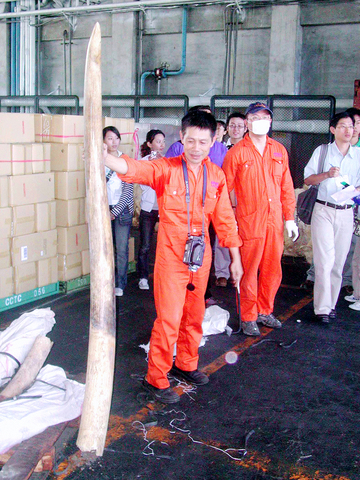Kaohsiung Harbor officials yesterday discovered a large amount of ivory in cargo that had originated in Tanzania.
The Kaohsiung Customs Office found an estimated 350 tusks in two containers, weighing around 2,500kg and valued at more than NT$100 million (US$3,100,775).
"The two containers entered Kaohsiung Harbor on June 11 and June 15, respectively, from Tanzania. They were to be transported to Manila on a smaller ship later this month," Ko Shih-hsien (郭世賢), an official with the Kao-hsiung Customs Office, said at a press conference.

PHOTO: CNA
The ivory was discovered in 18 wooden boxes when customs officials were checking suspicious cargo yesterday morning, he said.
The two containers were listed as containing sisal fiber, he added.
Sisal fiber is used to make such items as ropes or rugs. Tanzania is one of the world's main producers of sisal fiber.
Taiwan banned ivory imports in 1990, with the exception of items that have obtained an export permit from ivory-producing countries, to prove they do not violate the UN Convention on International Trade in Endangered Species.
As the cargo would have headed for the Philippines if it had not been discovered, the official said the bureau had launched an investigation regarding the Philippine importer.
He added that the bureau would contact and cooperate with international conservation organizations to probe the matter.
Some expressed fears that a large herd of as many as 400 elephants had been slaughtered by an ivory smuggling ring in order to harvest the tusks.
The tusks will be handed over to the Council of Agriculture to decide whether to destroy them or to reserve them for academic research.
Officials displayed the tusks at the harbor yesterday.
The official said the tusks were mostly from full-grown elephants, with a longest one being 180cm in length.
Wu Yu-chi (
Wu added that brown-colored ivory with bloodstains would indicate the tusks were from recently killed elephants.
Ivory trading is outlawed, but in some countries ivory is used to make high-priced jewelry and seals, Wu said.
The last time the country seized a large amount of smuggled ivory was in May 2000, when Kaohsiung Harbor discovered 332 tusks, weighing 2160kg.

MORE VISITORS: The Tourism Administration said that it is seeing positive prospects in its efforts to expand the tourism market in North America and Europe Taiwan has been ranked as the cheapest place in the world to travel to this year, based on a list recommended by NerdWallet. The San Francisco-based personal finance company said that Taiwan topped the list of 16 nations it chose for budget travelers because US tourists do not need visas and travelers can easily have a good meal for less than US$10. A bus ride in Taipei costs just under US$0.50, while subway rides start at US$0.60, the firm said, adding that public transportation in Taiwan is easy to navigate. The firm also called Taiwan a “food lover’s paradise,” citing inexpensive breakfast stalls

TRADE: A mandatory declaration of origin for manufactured goods bound for the US is to take effect on May 7 to block China from exploiting Taiwan’s trade channels All products manufactured in Taiwan and exported to the US must include a signed declaration of origin starting on May 7, the Bureau of Foreign Trade announced yesterday. US President Donald Trump on April 2 imposed a 32 percent tariff on imports from Taiwan, but one week later announced a 90-day pause on its implementation. However, a universal 10 percent tariff was immediately applied to most imports from around the world. On April 12, the Trump administration further exempted computers, smartphones and semiconductors from the new tariffs. In response, President William Lai’s (賴清德) administration has introduced a series of countermeasures to support affected

CROSS-STRAIT: The vast majority of Taiwanese support maintaining the ‘status quo,’ while concern is rising about Beijing’s influence operations More than eight out of 10 Taiwanese reject Beijing’s “one country, two systems” framework for cross-strait relations, according to a survey released by the Mainland Affairs Council (MAC) on Thursday. The MAC’s latest quarterly survey found that 84.4 percent of respondents opposed Beijing’s “one country, two systems” formula for handling cross-strait relations — a figure consistent with past polling. Over the past three years, opposition to the framework has remained high, ranging from a low of 83.6 percent in April 2023 to a peak of 89.6 percent in April last year. In the most recent poll, 82.5 percent also rejected China’s

PLUGGING HOLES: The amendments would bring the legislation in line with systems found in other countries such as Japan and the US, Legislator Chen Kuan-ting said Democratic Progressive Party (DPP) Legislator Chen Kuan-ting (陳冠廷) has proposed amending national security legislation amid a spate of espionage cases. Potential gaps in security vetting procedures for personnel with access to sensitive information prompted him to propose the amendments, which would introduce changes to Article 14 of the Classified National Security Information Protection Act (國家機密保護法), Chen said yesterday. The proposal, which aims to enhance interagency vetting procedures and reduce the risk of classified information leaks, would establish a comprehensive security clearance system in Taiwan, he said. The amendment would require character and loyalty checks for civil servants and intelligence personnel prior to